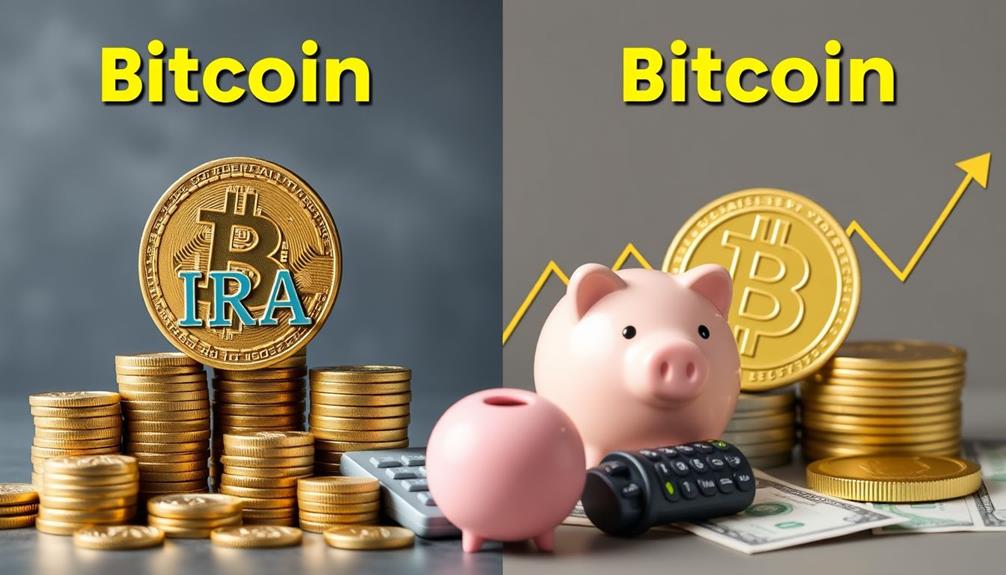When deciding between a Bitcoin IRA and a Bitcoin ETF, it depends on your financial goals. A Bitcoin IRA offers tax advantages and the potential for direct asset ownership, letting you control your investments. However, it can come with higher fees and requires a custodian. On the other hand, Bitcoin ETFs provide a simpler investment method with regulatory oversight and lower ongoing fees, but you lose some control. Both have potential for growth, making the right choice subject to your investment style. Stick around to explore more about how these options can fit into your wealth-building strategy.
Key Takeaways
- Bitcoin IRAs offer direct ownership of assets, allowing for self-custody and potential tax advantages in retirement accounts.
- Bitcoin ETFs provide a simpler investment approach with regulatory oversight and lower initial investment hurdles.
- Fees for Bitcoin IRAs can be higher due to setup and management costs, while ETFs have ongoing management fees but may offer better tracking performance.
- Direct ownership through Bitcoin IRAs allows for more transaction flexibility and control over investments compared to ETFs.
- Investor interest in both Bitcoin IRAs and ETFs is growing, but individual goals and risk tolerance will influence which option may yield greater wealth.
Overview of Bitcoin IRAs

Bitcoin IRAs offer a unique way to invest in cryptocurrencies within a tax-advantaged retirement account. With these accounts, you can invest in Bitcoin and other digital assets while enjoying potential tax-free growth or tax-deferred benefits, depending on whether you choose a Roth or Traditional IRA.
Unlike traditional IRAs, Bitcoin IRAs require a custodian to manage your crypto holdings, ensuring compliance with IRS regulations and facilitating smooth transactions.
It's important to note that investing in Bitcoin IRAs may come with higher fees compared to standard IRAs. Some providers charge setup fees, ongoing management fees, and transaction fees, so it's wise to carefully evaluate these costs.
As of 2023, you can contribute up to $6,000 annually to your Bitcoin IRA, or $7,000 if you're 50 or older, aligning with standard IRA contribution limits.
Diversifying your retirement portfolio through Bitcoin IRAs can be appealing if you're looking to gain exposure to the potential growth of cryptocurrencies over the long term.
These accounts not only provide a way to invest in the future of finance but also allow you to take advantage of tax benefits.
Exploring Bitcoin ETFs

For those contemplating alternative ways to invest in cryptocurrencies, Bitcoin ETFs present a compelling option. Unlike directly buying Bitcoin through crypto exchanges, these funds offer a simplified approach with regulatory oversight. This added layer of trust can be invaluable in such a volatile market.
Take BlackRock's Bitcoin ETF, which launched in January 2023 and has already amassed $21 billion in assets. Its competitive fee of just 0.12% is a significant draw compared to Grayscale's 1.5%.
With daily net inflows sometimes exceeding $100 million, Bitcoin ETFs reflect growing investor interest, pushing the total net asset value to around $60 billion. However, it's crucial to evaluate potential tracking errors and management fees, as these can impact your overall returns when compared to direct ownership of Bitcoin.
Investing in Bitcoin ETFs might be a wise choice if you're looking for a more hands-off strategy. You'll still gain exposure to Bitcoin's price movements without the hassle of managing wallets or steering through crypto exchanges.
Just remember to do your due diligence and weigh the pros and cons before diving in.
Comparative Fee Analysis

When considering investment options, understanding the fee structures of Bitcoin ETFs versus direct ownership is vital to maximizing your returns. Bitcoin ETFs often charge ongoing management fees, which can greatly impact your profitability. For instance, BlackRock offers a competitive introductory rate of 0.12%, while Grayscale imposes a hefty 1.5% fee.
Here's a quick comparison of fees:
| Investment Type | Typical Fees |
|---|---|
| Bitcoin ETF (BlackRock) | 0.12% (introductory) |
| Bitcoin ETF (Grayscale) | 1.5% |
| Direct Ownership | One-time exchange fees |
Higher fees in Bitcoin ETFs can diminish your returns compared to direct ownership, which generally incurs only one-time exchange fees. Some ETF providers may even have fees exceeding 1%, emphasizing the need to compare costs closely. Additionally, an upcoming fee increase to 0.25% for certain ETFs serves as a reminder to monitor fee changes that could affect your long-term performance. While lower fees in direct exchanges may attract cost-conscious investors, keep in mind that ETFs might provide better tracking error performance, which is vital for effective investment.
Investment Control and Ownership

Gaining control over your investments is an essential aspect of financial freedom, and with a Bitcoin IRA, you can achieve direct ownership of your assets. Unlike Bitcoin ETFs, which don't offer actual ownership of the underlying cryptocurrency, a Bitcoin IRA allows you to hold Bitcoin directly, granting you self-custody and full investment control. This means you can transfer your holdings to hardware wallets, enhancing your security and autonomy.
When you own Bitcoin through a Bitcoin IRA, you simplify access for transactions. In contrast, Bitcoin ETFs may impose restrictions and limit your trading hours, which can hinder your flexibility. Additionally, Bitcoin IRAs can offer potential tax advantages, as they're structured within retirement accounts, whereas cashing out Bitcoin ETF shares can trigger taxable events.
Evaluating your investment control is significant. With a Bitcoin IRA, you can remember seed phrases for secure access to your funds from anywhere, ensuring you maintain ownership. This contrasts sharply with Bitcoin ETFs, where asset managers dictate the terms, leaving you with less control over your investments.
Ultimately, direct ownership through a Bitcoin IRA empowers you to take charge of your financial future.
Future Trends in Bitcoin Investments

As investors increasingly seek control over their assets, the landscape of Bitcoin investments is evolving rapidly. With total net assets across Bitcoin ETFs reaching around $60 billion, traditional investors are showing a growing interest in this digital asset.
Daily net inflows exceeding $100 million highlight the strong demand and potential for future growth in the Bitcoin ETF sector.
Major providers like BlackRock and Fidelity are expanding their offerings, leading to increased competition that could lower fees for you. The anticipated launch of a Bitcoin ETF by Vanguard is another significant development, signaling that institutional players are entering the market, which may enhance credibility and attract more retail investors.
As regulatory frameworks continue to evolve, Bitcoin ETFs are likely to become more accessible globally, encouraging greater participation in the investment space.
You might also see an increased interest in diversifying portfolios with Bitcoin alongside real estate or another cryptocurrency. This trend could reshape how you think about wealth accumulation and asset management in the coming years.
Embracing these changes could position you well for potential financial gains.
Frequently Asked Questions
What Is the Difference Between a Bitcoin IRA and Etf?
A Bitcoin IRA lets you hold Bitcoin in a tax-advantaged account, while an ETF gives you exposure to Bitcoin without owning it. IRAs offer more control, but ETFs provide easier liquidity and lower fees.
What Is the Best Way to Invest in Bitcoin to Make Money?
To make money investing in Bitcoin, you should assess your risk tolerance, investment goals, and preferences. Consider options like Bitcoin IRAs for tax advantages or ETFs for easier access, depending on your strategy.
Is It Better to Invest in Bitcoin or Bitcoin Etf?
Investing in Bitcoin's like holding a treasure map; you've got control and flexibility. If you prefer simplicity and oversight, Bitcoin ETFs might suit you better. Weigh ownership against convenience to find your best fit.
Is Bitcoin IRA Worth It?
If you're considering a Bitcoin IRA, weigh the potential tax advantages against higher fees and regulatory complexities. It can offer long-term gains, but make sure you're prepared for the volatility and risks involved.
Conclusion
In choosing between a Bitcoin IRA and a Bitcoin ETF, you're balancing control and flexibility. With a Bitcoin IRA, you've got ownership and potential tax benefits, but it comes with higher fees and restrictions. On the flip side, a Bitcoin ETF offers ease of trading and lower costs, yet you sacrifice some control over your investments. Ultimately, your decision hinges on whether you prioritize ownership or convenience in your quest for wealth in the crypto world.










